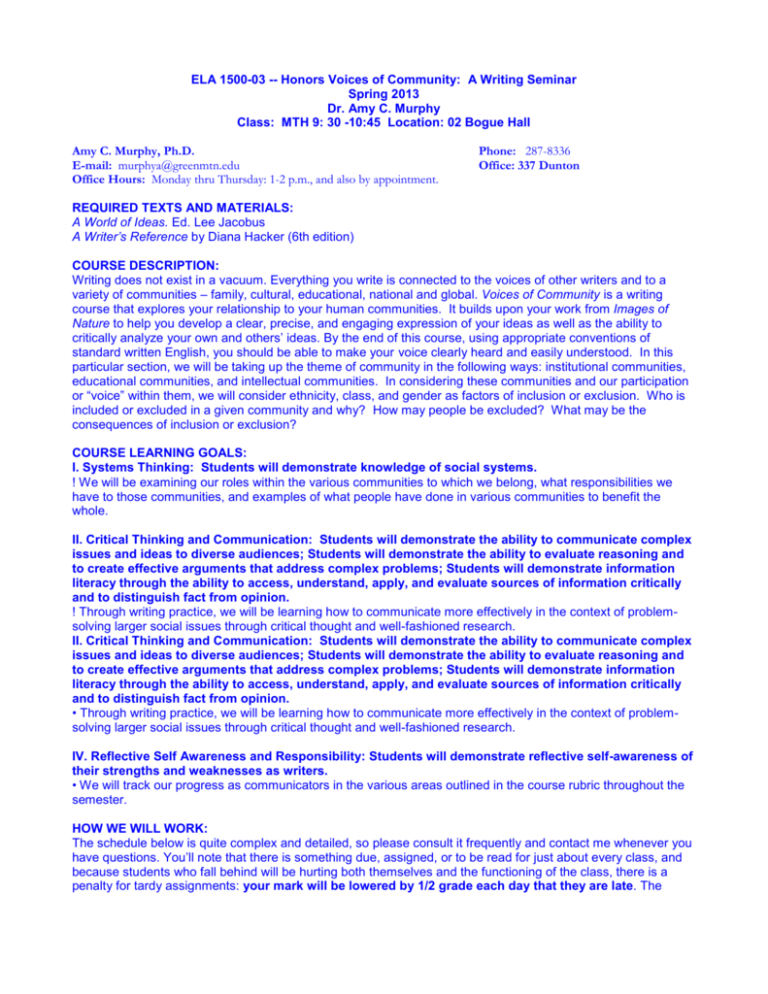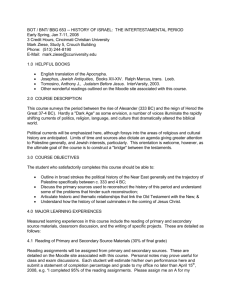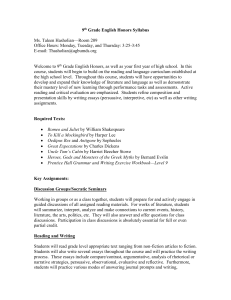Section 3
advertisement

ELA 1500-03 -- Honors Voices of Community: A Writing Seminar Spring 2013 Dr. Amy C. Murphy Class: MTH 9: 30 -10:45 Location: 02 Bogue Hall Amy C. Murphy, Ph.D. E-mail: murphya@greenmtn.edu Office Hours: Monday thru Thursday: 1-2 p.m., and also by appointment. Phone: 287-8336 Office: 337 Dunton REQUIRED TEXTS AND MATERIALS: A World of Ideas. Ed. Lee Jacobus A Writer’s Reference by Diana Hacker (6th edition) COURSE DESCRIPTION: Writing does not exist in a vacuum. Everything you write is connected to the voices of other writers and to a variety of communities – family, cultural, educational, national and global. Voices of Community is a writing course that explores your relationship to your human communities. It builds upon your work from Images of Nature to help you develop a clear, precise, and engaging expression of your ideas as well as the ability to critically analyze your own and others’ ideas. By the end of this course, using appropriate conventions of standard written English, you should be able to make your voice clearly heard and easily understood. In this particular section, we will be taking up the theme of community in the following ways: institutional communities, educational communities, and intellectual communities. In considering these communities and our participation or “voice” within them, we will consider ethnicity, class, and gender as factors of inclusion or exclusion. Who is included or excluded in a given community and why? How may people be excluded? What may be the consequences of inclusion or exclusion? COURSE LEARNING GOALS: I. Systems Thinking: Students will demonstrate knowledge of social systems. ! We will be examining our roles within the various communities to which we belong, what responsibilities we have to those communities, and examples of what people have done in various communities to benefit the whole. II. Critical Thinking and Communication: Students will demonstrate the ability to communicate complex issues and ideas to diverse audiences; Students will demonstrate the ability to evaluate reasoning and to create effective arguments that address complex problems; Students will demonstrate information literacy through the ability to access, understand, apply, and evaluate sources of information critically and to distinguish fact from opinion. ! Through writing practice, we will be learning how to communicate more effectively in the context of problemsolving larger social issues through critical thought and well-fashioned research. II. Critical Thinking and Communication: Students will demonstrate the ability to communicate complex issues and ideas to diverse audiences; Students will demonstrate the ability to evaluate reasoning and to create effective arguments that address complex problems; Students will demonstrate information literacy through the ability to access, understand, apply, and evaluate sources of information critically and to distinguish fact from opinion. • Through writing practice, we will be learning how to communicate more effectively in the context of problemsolving larger social issues through critical thought and well-fashioned research. IV. Reflective Self Awareness and Responsibility: Students will demonstrate reflective self-awareness of their strengths and weaknesses as writers. • We will track our progress as communicators in the various areas outlined in the course rubric throughout the semester. HOW WE WILL WORK: The schedule below is quite complex and detailed, so please consult it frequently and contact me whenever you have questions. You’ll note that there is something due, assigned, or to be read for just about every class, and because students who fall behind will be hurting both themselves and the functioning of the class, there is a penalty for tardy assignments: your mark will be lowered by 1/2 grade each day that they are late. The timely completion of all writing assignments, and the taking of the final exam are the minimum requirements for passing the course. When I return assignments to you, problems will be accompanied by either my written comments or a reference to the “Revision Symbols” page at the end of Hacker. If I am returning a rough draft to you, I expect your revisions to be included in the final draft; if I am returning a final draft to you, you must make the indicated corrections and turn them in within one week. All revised assignments MUST be handed in with all previous versions. If you do not understand what is wrong with a problem that is marked, come and see me—this is your opportunity to receive individual guidance. We will be having the occasional individual writing conference, and this will be on the syllabus schedule. I WANT YOU TO ALL LEAVE THIS CLASS BETTER WRITERS THAN WHEN YOU ARRIVED! Everyone can improve, and that is our goal. KEEP EVERYTHING YOU WRITE—originals, revisions, notes, etc. You will need them. For ecological reasons, please print your assignments out on previously used paper, if possible. I will occasionally ask that you submit your papers via the Epsilen online system, so be prepared to do this. In terms of total pages of formal revised writing, students will be expected to hand in at least 20 pages of polished writing throughout the semester, in the form of two 5-page essays and one 10-page research paper. Your writing will include one research paper of 10 or more pages, and two five-page papers. Each of these will go through drafts prior to the final polished product, which will enable you to refine both your writing and your thinking. All work must be typed and follow the MLA format described by Hacker (p. 48-49). EVERYONE WILL BE USING MLA FORMAT IN THIS CLASS. 5-PAGE ESSAYS: For the Honors section, students will produce three 5-page essays, which will go through the revision process. The five-page papers must each utilize a minimum of three sources, at least one of which is not on the course reading list. RESEARCH PAPER For Research Paper Guidelines, see Hacker starting on page 317. Length: 12 or more pages (3500 words), excluding Works Cited page, which must include 20 sources,. You will also produce an annotated bibliography, A final copy of the research paper must be submitted electronically to the appropriate Moodle course drop box by the student. You will additionally turn in a hard copy to your instructor. PLENARY RESPONSE PAPER We will be attending a plenary session. You will write a response paper based on his speech; details will be given in class later. GRADING: Working Portfolio: All stages of the three 5-page source based essays 50% (including all revisions) Research Paper 25% Final Exam 5% Plenary Response Paper 5% Collaborative work, informal or shorter essays, discussion questions, and quizzes 15% ATTENDANCE: Attendance is expected. In class work (including quizzes and collaborative assignments) cannot be made up; thus missing class will affect your final grade. If you miss three classes, I will advise you to withdraw from the course. ADVICE? 1. Do the reading, and 2. be prepared to respond to the issues raised in each reading in discussion, writing, or both. COMMUNITY COMPONENT Just as in Images of Nature, all students taking Voices of Community do themselves constitute a community—a learning community that shares the first-year experience as well as discussions and experiences unique to them. We will be exploring this throughout the semester, by joining forces with other sections of Voices of Community for group discussions, activities, and celebrations. Stay tuned! We have an opportunity here to do exciting, meaningful, and fun things both within and beyond our GMC community. ACCOMODATIONS If you have a hidden or visible disability which may require classroom or test accommodations, please let me know as soon as possible. If you have not already done so, please register with the Calhoun Learning Center, which is the office responsible for coordinating accommodations and services for students with disabilities. The Calhoun Learning Center is located on the 3rd floor of Griswold Library. If you have questions, please contact Christina Fabrey at x8812. PLAGIARISM Presenting as one’s own work the work of another person (e.g., the words, ideas, information, data, evidence, organizing principles or style of presentation of someone else). Plagiarism includes paraphrasing or summarizing without acknowledgement, submission of another’s work as one’s own, the purchase of prepared research or completed papers or projects, and the unacknowledged use of research sources gathered by someone else. Failure to indicate accurately the extent and precise nature of one’s reliance on other sources is also a form of plagiarism. The student is responsible for understanding the consequences for violating College regulations. Examples of plagiarism include: failure to acknowledge the source(s) of even a few phrases, sentences or paragraphs; failure to acknowledge the source(s) (quoted, paraphrased or summarized) of major sections of passages in the paper or project; failure to acknowledge the source(s) of a major idea or the source(s) for an ordering principle central to the paper’s or project’s structure. In the preparation of research papers, reports, essays, compositions and speeches, students will generally utilize information gained from others. It is absolutely necessary to acknowledge these resources. Each instructor has the authority and responsibility of determining the assessment of penalties for academic dishonesty within the context of their course. If a breach of conduct is particularly serious it may warrant action beyond the context of the course in which case an instructor may refer the case to the Student Judicial Board. In all cases, faculty should report the incident to the Dean of Faculty for recording and possible action. TENTATIVE SCHEDULE: SUBJECT TO CHANGE WITH NOTICE WEEK ONE: January 15 Introduction to the Course; Narrative of writing experiences JAN 17 “Narrative of the Life of Frederick Douglass” (157) WEEK TWO: Jan 22 “The Banking Concept of Education”—Paolo Friere; Maria Montesorri (scanned articles in Moodle— please read and print before class and bring with you). JAN 24 Voices of Community Plenary Speaker Timothy Patrick McCarthy : "Human Rights, Human Wrongs: The Long History of Slavery and Abolition” Friere and Montessori cont; Hsun Tzu “Encouraging Learning”—scanned article in Moodle; WEEK 3 JAN 29 Okakok—“Serving the Pupose of Education” --in Moodle; “Theory of Multiple Intelligences” (503 ); Putting it all together—collaborative discussion questions 31 Draft due of essay 1 for peer review. WEEK FOUR: FEB 5 Final draft of essay 1 due; read John Berger “Ways of Seeing,” in Moodle (print and bring to class with you. 7 Museum visit “Loss of the Creature,” in Moodle (print and bring to class with you. WEEK FIVE FEB 12 class discussion; additional essays in Moodle TBA FEB 14 : PEER REVIEW OF ESSAY 2; mandatory conferences FEB 19 conferences 21 final draft of essay 2 due; the rhetorical tradition: Pericles, Plato and Aristotle—essays in Moodle FEB 25: Wollstonecraft; th FEB 28 : MLK “Letter from Birmingham Jail”; Final Draft due of essay 2 due for me and outside reviewer WEEK EIGHT: MARCH 1 SPRING BREAK; NO CLASS





